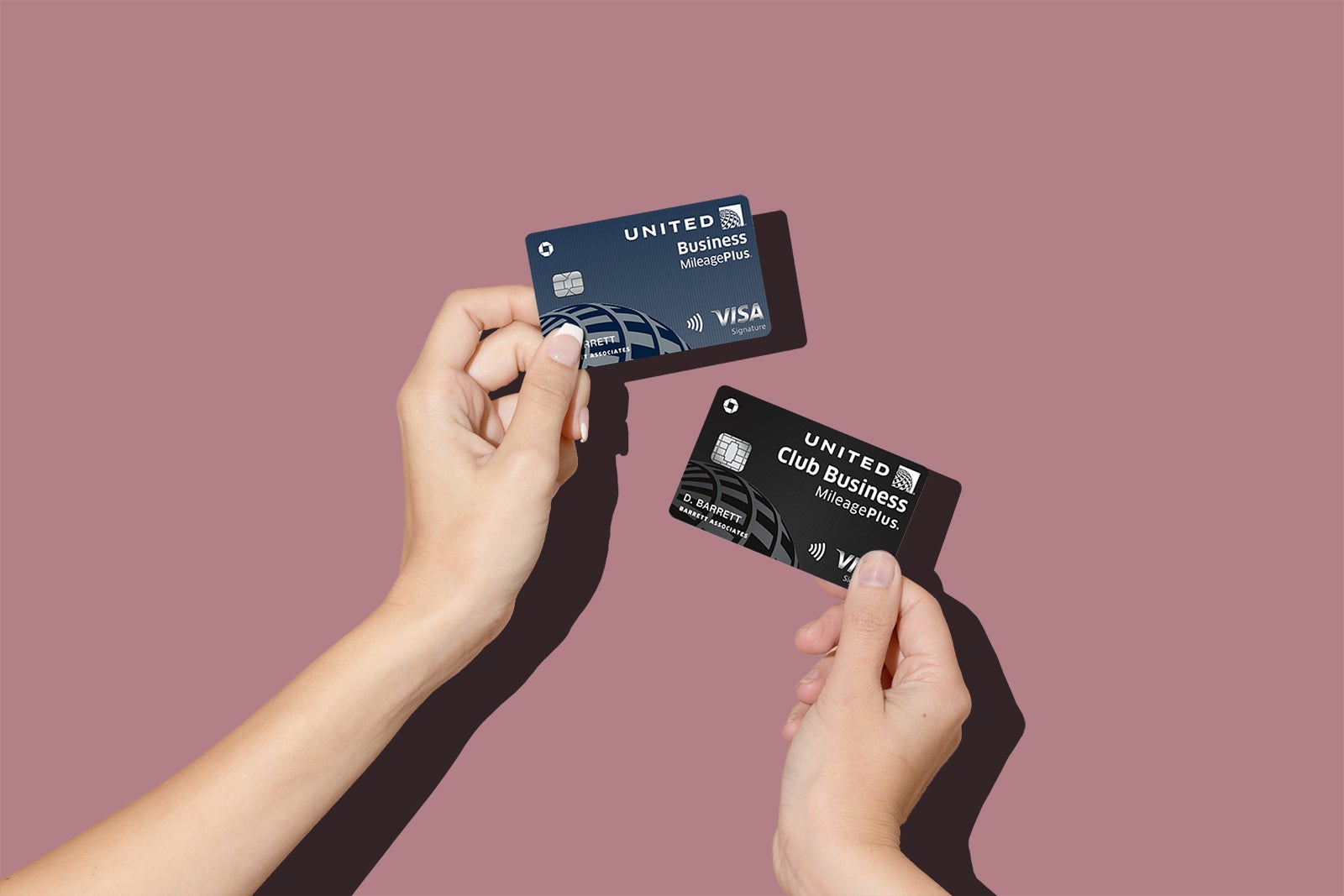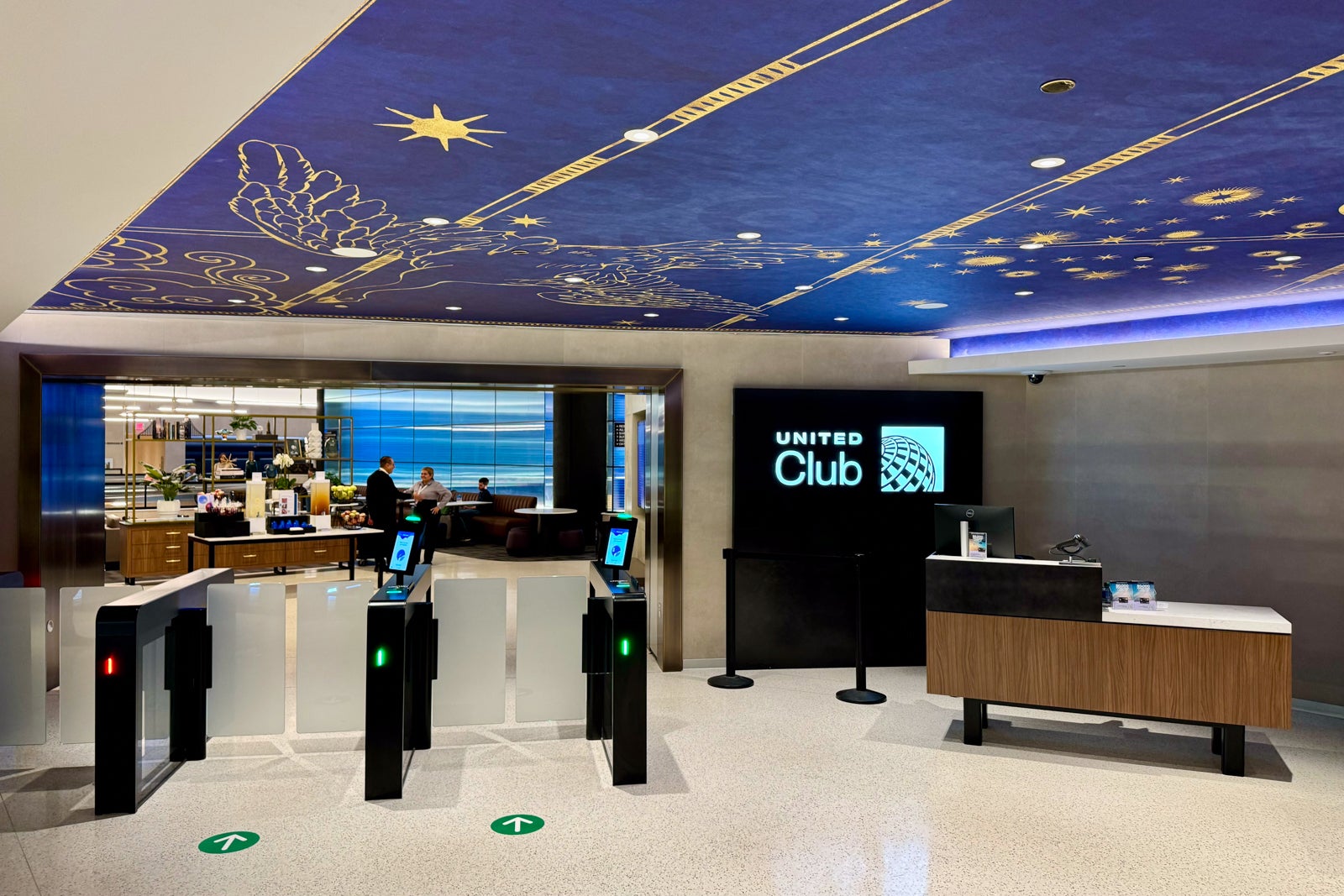Editor’s note: This is a recurring post, regularly updated with new information and offers.
United offers two business credit cards similar in name but very different in terms of annual fees and benefits.
The mid-tier United℠ Business Card offers great value for a low annual fee. In contrast, the top-tier United Club Business Card has a substantially higher annual fee and some valuable benefits for frequent United business travelers.
If you’re a business owner who wants a United cobranded card, which of these cards is a better fit for you? Let’s look at both cards’ benefits and dive deeper into each one.
The information for the United Club Business has been collected independently by The Points Guy. The card details on this page have not been reviewed or provided by the card issuer.
United Business vs. United Club Business comparison
| United Business Card | United Club Business Card | |
| Sign-up bonus | 100,000 bonus miles after you spend $5,000 in the first three months of account opening | 75,000 bonus miles and 1,000 Premier qualifying points after you spend $5,000 in the first three months of account opening |
| Annual fee | $99 | $450 |
| Earning | 2 miles per dollar on United
2 miles per dollar at restaurants, gas stations, office supply stores, local transit and commuting 1 mile per dollar on all other purchases |
2 miles per dollar on United
1.5 miles per dollar on all other purchases |
| Lounge access | Two United Club one-time passes annually | United Club membership |
| United benefits | One free checked bag
Priority boarding $100 annual travel credit after you make seven or more $100 United purchases each anniversary year 25% back on United Inflight and Club premium drink purchases Up to 1,000 PQPs through spending Expanded award availability Premier upgrades on award tickets 5,000 miles each card anniversary
|
Two free checked bags
Premier Access services — designated check-in lines, priority security lanes, priority boarding and priority baggage handling (where available) 25% back on United Inflight and Club premium drink purchases Up to 1,000 PQP through spending Expanded award availability Premier upgrades on award tickets |
| Other benefits | Travel and purchase protections
Complimentary DashPass membership No foreign transaction fees |
Travel and purchase protections
Complimentary DashPass membership Avis President’s Club elite status No foreign transaction fees
|
United Business vs. United Club Business welcome offer
Currently, the United Business offers 100,000 bonus miles after spending $5,000 in the first three months of account opening. The United Club Business card offers 75,000 bonus miles and 1000 PQP after spending $5,000 in the first three months of account opening.

100,000 and 75,000 United miles are worth $1040 and $780, respectively, according to TPG’s most recent valuations. That number of miles could be enough for several domestic economy award tickets or one-way tickets in a premium cabin on United or its partners.
Winner: Tie. The United Business card offers 25,000 more miles than the Club Business card, but the Club Business card gives you 1,000 PQP, which can be useful if you are trying to achieve United MileagePlus Premier status.
Related reading: How to unlock additional award availability with United credit cards
United Business vs. the United Club Business benefits
The United Business Card includes a first checked bag free for cardholders and up to one companion on United flights — up to $120 in value. Cardholders also receive priority boarding, a 25% inflight purchase discount and two one-time United Club passes on each account anniversary. Plus, cardholders receive 5,000-anniversary bonus miles each account year, and if you use the card to make seven or more eligible United purchases of at least $100 each in an account year, you will receive a $100 statement credit.
Those with the United Club Business Card get a free first and second checked bag for themselves and a companion on the same reservation purchased using the card (up to $280 in value).
Cardholders can use the airline’s Premier Access services, including designated check-in and security lines, as well as priority boarding and baggage handling. They also receive a 25% refund on inflight purchases of food, beverages, Wi-Fi, and expanded award availability, which can save them tens of thousands of miles annually.

These are helpful benefits, but the most valuable United Club Business perk is the complimentary United Club membership. It includes access to United Club airport lounges, some Star Alliance lounges, and up to two guests (or an adult and any children) when flying United and its partners. This perk alone is worth $550-$650 per year and is probably the most significant reason to get this card.
Finally, both cards can help you with a modest boost toward Premier elite status with United. For every $500 you spend on purchases per calendar year, you earn 25 PQP, up to 1,000 PQP per year. Earning status through credit card spending is easier since United lowered the spending requirement for PQP.
Additional benefits on both cards include no foreign transaction fees, primary rental car insurance, travel accident insurance, trip cancellation and interruption, and purchase protection for new items. Both cards also offer a complimentary one-year DashPass membership from DoorDash, and the United Club Business Card provides Avis President’s Club elite status, which provides benefits like upgrades and expanded availability.
Winner: United Club Business. Two checked bags and a United Club membership are hard to beat.
Related reading: The ultimate guide to United Club access
Earning miles with the United Business vs. the United Club Business
The United Business Card earns bonus points in several different categories. It accrues 2 miles per dollar on United purchases, gas stations, restaurants and office supply stores, and local transit and commuting — including mass transit systems, tolls, taxis and ride-hailing services.

By contrast, the United Club Business Card earns 2 miles per dollar only on United purchases and has no additional bonus categories. However, it does earn a flat 1.5 miles per dollar on all other purchases.
If you tend to make many purchases at the specific types of merchants where the United Business Card accrues 2 miles per dollar spent, then that card’s earning rates could help you rack up the miles for award flights quickly.
However, if your purchase activity covers a more diverse range of categories, the simpler earning formula on the Club Business might be better for you.
Winner: United Business. It offers bonus points in several more categories than the Club Business.
Redeeming miles with the United Business vs. the United Club Business
Both United business credit cards earn United miles, which are deposited into the cardholder’s MileagePlus account. You can redeem United miles for United and United-Express flights and flights on any Star Alliance carrier or partner airline.

TPG credit cards writer Chris Nelson is a longtime United loyalist. He has taken advantage of many partner redemptions and redeemed his miles for many saver award tickets, including last-minute Polaris business-class flights to Europe.
Winner: Tie. Both cards earn United miles, which can be redeemed through the MileagePlus program.
Related: How to redeem points with United MileagePlus
Should I get the United Business or the United Club Business?
If your business purchases tend to be in the bonus categories the United Business Card offers, its elevated earning rates can help you rake in miles. On the other hand, if you regularly travel with United, you’ll likely prefer the United Club Business for its lounge access, additional free checked baggage, Premier Access services at the airport and more comprehensive travel protections.
How to upgrade from United Business to United Club Business
Both cards are issued by Chase and fall within the same credit card family. This is useful because if you have the United Business card, you can upgrade to the United Club Business card by calling Chase customer service. Do note that upgrading to the United Club Business will not make you eligible for the card’s sign-up bonus and may make you ineligible to earn a sign-up bonus on the same card if you try to apply for the same card within 24 months.
Related: The ultimate guide to credit card upgrades
Bottom line
Both cards are tailored to United loyalists and offer the same welcome bonus for new applicants. Although there is a dramatic difference in the annual fee, the benefits of the United Club more than make up for the hefty annual fee for those able to maximize them. Before applying for either card, map your business expenses, determine how often you fly on United, and select the right card to complement your business expenses and redemption aspirations.
To learn more, read our full review of the United Business Card.
Apply here: United Business Card




